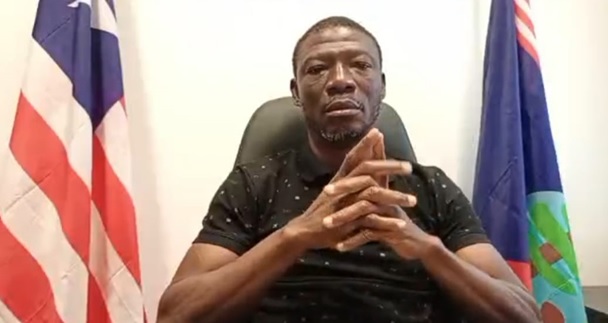MONROVIA – A viral video featuring three senior officials from President Joseph Boakai’s administration—Cornelia Wonkerleh Kruah, Deputy Minister for Administration at the Ministry of State for Presidential Affairs; Mo Ali, Managing Director of the Liberia Water and Sewer Corporation (LWSC); and Patrick Honnah, Commissioner at the Liberia Telecommunications Authority (LTA)—has drawn widespread condemnation. The video shows the officials enjoying a weekend getaway in Nimba County, dancing to a Notorious B.I.G. track while in the swimming pool, generating accusations of insensitivity during a time of economic crisis.
Prominent activist Martin K. N. Kollie criticized the actions in a strongly worded statement, calling the display “sheer insensitivity.” He denounced the officials, all members of the ruling Unity Party, for flaunting opulence while ordinary Liberians struggle to afford basic necessities.
“This is not what ‘Rescue’ means. Far from it,” Kollie stated, referencing the administration’s campaign slogan. “Public service is not intended for self-comfort and lavish living, especially in the world’s 8th poorest country. While thousands of jobless Liberians struggle daily for survival, flaunting such a video as custodians of public resources demonstrates a lack of empathy.”
Kollie, a supporter of President Boakai, further criticized the officials for engaging in behavior they had condemned under the previous administration. “What was wrong yesterday when we criticized the CDC remains wrong today,” he asserted. “The focus should be on improving the lives of ordinary Liberians, not flaunting luxury.”
The video has ignited a firestorm on social media, with many Liberians expressing frustration. Seleke Kromah, a commenter, highlighted the officials’ contrasting lifestyles before and after assuming power. Referring to Mo Ali, Kromah recalled a time when Ali had to rely on financial assistance for medical bills. “Now Moi has been ‘rescued,’” Kromah wrote sarcastically. “They’re enjoying while the rest of us swim in debts and economic hardship.”
Another commenter, Fredie Fred, remarked, “While the bulk of us are drowning in frustration, unpaid bills, and economic struggles, our leaders are literally swimming in luxury.”
Some defended the officials, arguing they have a right to leisure. This divide underscores a broader public sentiment: while leisure is not inherently wrong, it becomes problematic when flaunted by public officials in a nation grappling with poverty and economic instability.
Critics have also pointed out that during their time in opposition, Kruah, Honnah, and Ali never displayed such ostentation, often portraying themselves as champions of ordinary Liberians. Now, as part of the ruling establishment, their actions seem disconnected from the struggles of those they claim to serve.
The backlash highlights the growing frustration among Liberians over perceived government neglect and mismanagement. It raises questions about the Unity Party’s commitment to its “Rescue” agenda and its ability to address systemic inequalities.
In a country where the majority live on less than $2 a day, public displays of wealth by those in power are not just tone-deaf but could erode public trust in the administration.
As Kollie put it, “The people’s lives, welfare, and interests matter. This is not the ‘Rescue’ we promised.”






